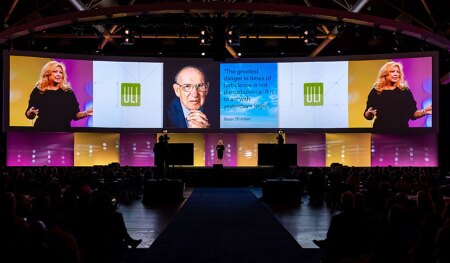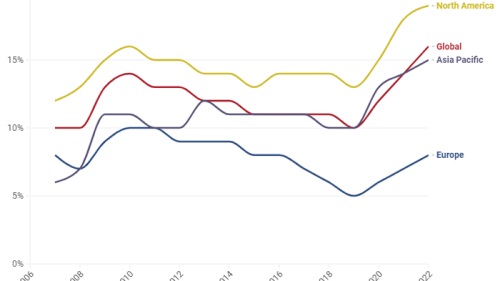During the Opening General Session of the 2023 ULI Spring Meeting in Toronto, Dr. Pippa Malmgren, a former special assistant for economic policy on the National Economic Council under President George W. Bush, looked at global economics, geopolitics, and the future.
Malmgren quoted Peter Drucker, an influential thinker on management, saying: “The greatest danger in times of turbulence is not the turbulence. It is to act with yesterday’s logic.”
Addressing the U.S. debt ceiling showdown between the Biden administration and the U.S. House, Malmgren said that inflation helps reduce the cost in dollars of the U.S. debt. “Inflation is here, but it’s not as bad as it was in the 1970s. . . . We’ve been through this,” she said.
Some politicians lack sufficient imagination, she said. With domestic migration, the U.S. politics will increasingly align toward the center of the spectrum, she said. Also, some of the leadership and problem-solving will come from the next generation of politicians because both President Biden and California Senator Dianne Feinstein are in their 80s.
The ongoing conflict in Ukraine is in many ways a symptom of larger problems among the world’s superpowers, Malmgren said. “What are the rules of the game?” she asked. In the post–World War II era, the United States set up a system of institutions that largely worked for decades, she noted. The blockade of Chinese companies such as Huawei break those rules of free trade and innovation, so new rules will be needed or adopted, she said.
Cyberattacks are already occurring that escape notice, Malmgren said, such as when an undersea cable is cut, denying internet access to countries and companies. High energy and food costs are also being weaponized in proxy battles between the West and Russian and China.
On a more positive side, Malmgren said that as a result of planned U.S. space missions to the moon, people may soon be gathering solar energy from space. Also, the Saudis are looking at solar energy as that country makes the transition from oil to other power sources like solar and nuclear fusion.
“We may soon have space-based solutions to these earthbound problems,” said Malmgren, citing the ongoing discussion of decarbonization and environment, social, and governance concerns. Mining of asteroids could help supply rare earth minerals needed for batteries, she said. Satellite connectivity such as Starlink could also help mitigate the undersea cable cutting issue.
Earth is in “a hot war in cold places,” such as the arctic and outer space, she said, but also “a cold war in hot places” such as Africa. There is very little media coverage of what happens in space or on the bottom of the ocean, Malmgren noted.
She cited the Chinese weather balloon episode and the discussion of whether TikTok is safe for U.S. mobile phone users as signs of this low-level aggression.
Despite the so-called crypto winter, Malmgren highlighted that Starbucks sold 2,000 nonfungible tokens for its Odyssey program in March. Originally priced at $100, these tokens are selling on the secondary market for $120,000 each, she said.
Malmgren also noted that the vision of globalization has changed from “All the jobs are going to China” to “All the jobs are going everywhere,” she said, with manufacturing returning to North America and Europe.
The collapse of institutions like Silicon Valley Bank is potentially a good thing, she suggested, because it could shift some of the venture capital funds and high-risk investments from the Bay Area to places such as Toronto, Detroit, and Charlotte, North Carolina.
Malmgren was introduced by Sheila Botting, president, Americas professional services, with ULI corporate partner Avison and Young. Botting, a native Torontonian, highlighted that Canada added more than 1 million immigrants to the economy just last year and has more high-rise construction cranes than Seattle and Los Angeles combined.






